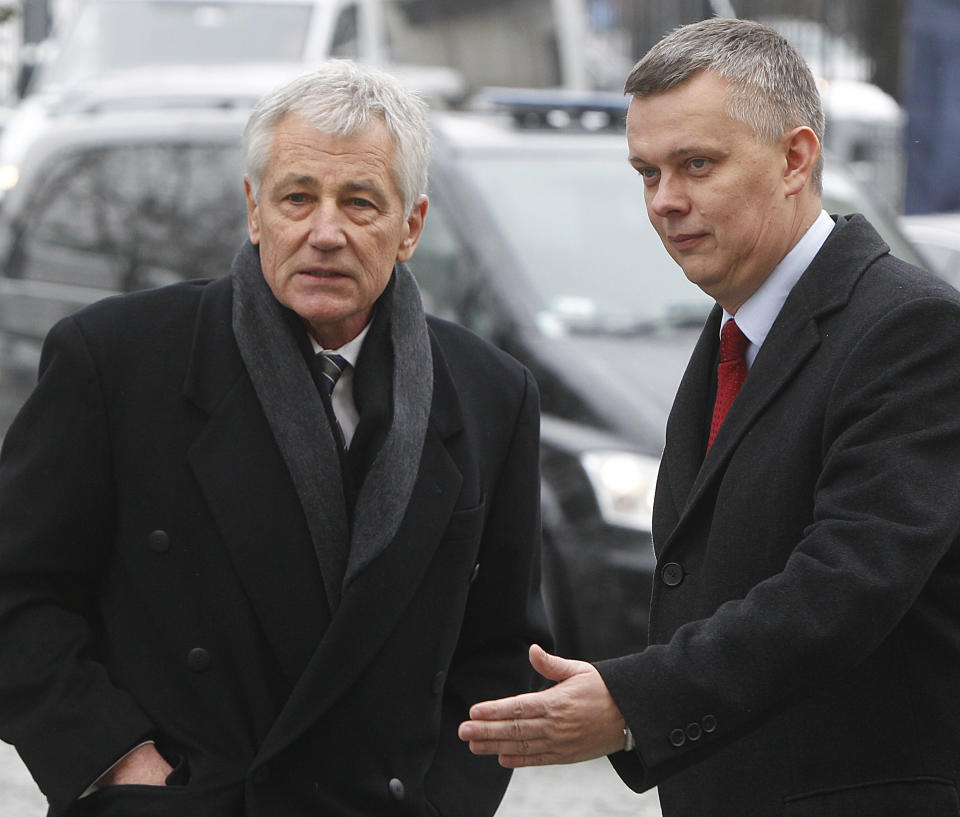Chemical weapons watchdog discusses Syria mission
THE HAGUE, Netherlands (AP) — The United States on Thursday criticized Syria for its slow pace in moving chemical weapons out of the country for destruction, ratcheting up pressure on President Bashar Assad to cooperate with an unprecedented international chemical disarmament mission.
Speaking in Warsaw, Poland, U.S. Defense Secretary Chuck Hagel said Damascus needs to speed up the operation, which already is well behind schedule.
"I do not know what the Syrian government's motives are, or if it was incompetence," he said.
"What we do know is they are behind," he added, and "they need to fix this."
At a meeting Thursday of the executive council of the Organization for the Prohibition of Chemical Weapons in The Hague, U.S. representative Robert P. Mikulak said Syria has only moved around 4 percent of the most toxic chemicals in its stockpile. All of the most toxic chemicals were supposed to have been out of the country by Dec. 31.
Mikulak said the Syrian effort to move chemicals has "seriously languished and stalled."
In a note prepared last week for the behind-closed-doors meeting of the executive council, Director-General Ahmet Uzumcu said he spoke to U.N. Secretary-General Ban Ki-moon on Jan. 18, "and they both agreed that it was necessary for the removal process to pick up pace."
Under a timeline drawn up last year, the most toxic chemicals in Syria's 1,300-metric-ton stockpile were to have been removed from the country by Dec. 31, but that deadline was missed due to poor security in war-torn Syria and other factors.
So far, just two small consignments of chemicals have been shipped out. One of the shipments came after Uzumcu's note was written.
Uzumcu said in the note that Syria had informed him of "certain security threats," but insists it is committed to removing the chemicals "as soon as possible." He did not elaborate on the nature of the threats.
An American ship, the MV Cape Ray, is on its way to the Mediterranean Sea to pick up the most toxic chemicals in Syria's stockpile, including mustard gas and raw materials for making sarin nerve agent.
The Cape Ray is equipped with two machines called Field Deployable Hydrolysis Systems that will mix the Syrian chemicals with water and a mixture of other chemicals in a titanium reactor to render them inert.
Danish and Norwegian cargo ships are picking up the Syrian chemicals from Latakia port and will transfer them to the Cape Ray in the Italian port of Gioia Tauro.
The OPCW is examining tenders from 14 private commercial chemical destruction companies bidding to eliminate less-toxic Syrian chemicals and waste generated by the Cape Ray. Germany also has said it will incinerate 370 tons of waste created when the Cape Ray neutralizes Syrian mustard gas.
But while the OPCW's preparations continue, the success of the mission is now largely dependent on Syria getting its chemicals to Latakia in the midst of a devastating civil war now in its third year.
While Hagel was critical of Damascus, he remained optimistic the chemical disarmament could still be completed by the end of June.
"We believe that this effort can continue to get back on track, even though we're behind schedule," Hagel said.
____
Associated Press writer Robert Burns in Warsaw, Poland, contributed to this report.




